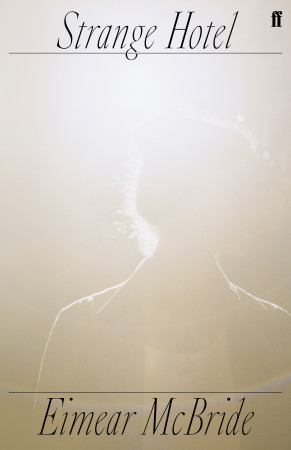Book Review: “Strange Hotel” — Battling the Inner Critic
By Lucas Spiro
Strange Hotel focuses on a woman’s life in middle age, suspended between the hollow satisfactions of memory and anxiety about the future.
Strange Hotel by Eimear McBride. Faber & Faber, 149 pages. (American edition from Farrar, Straus & Giroux in early May.)

When you’re as celebrated an author as Eimear McBride, who came on the scene in 2013 with her devastating and original debut novel A Girl Is a Half-Formed Thing, the pressure to meet literary expectations is immense. The bar for McBride’s third book, Strange Hotel, has been set very high.
On the one hand, the new novel explores McBride’s major themes: femininity, sex, and the existential weight of becoming, which to this writer amounts to an artistic act. But Strange Hotel explicitly departs from her previous books, bildungsromane about the development of young women, filled with tales graphic, sexually charged, and traumatic. This book focuses on a woman’s life in middle age, suspended between the hollow satisfactions of memory and anxiety about the future. Strange Hotel also suggests that McBride is floating between settling for her current status (as an “exalted” author) and the writer she might become.
Nothing really happens in Strange Hotel. What little story there is serves to illuminate the female protagonist’s character via a series of ruminative sections, each of which takes place in a different hotel room in a different city. The sections are linked together by a string of place names that the woman has visited. Ostensibly, the “story” takes place in each of the locations that are named: Avignon, Prague, Oslo, Auckland, Austin, and a hotel room that exists in the woman’s imagination and/or memory. The place names are what (at least on a surface level) push the story along. Comparing and contrasting the patterns of thought in each of the various rooms invites the reader to make sense of (or find meaning in) the protagonist’s consciousness. This level of modernist difficulty will no doubt turn off many, who will condemn Strange Hotel as pretentious or self-indulgent. That objection might have some validity if the unorthodox structure didn’t make us curious about a mind whose personal observations approach the universal, if not the profound.
But who is this woman? Why is she in all of these hotel rooms? What is she trying to accomplish, if anything? She bears some resemblance to Eilis, the 18-year-old from McBride’s previous book, The Lesser Bohemians, though 20 years older and adrift. But to look at the character that way seems gimmicky and pointless. McBride intends for this woman to show the reader how different she is from McBride’s earlier figures. For one, the female in Strange Hotel is extremely conscious of putting limits on herself, of questioning her desires as opposed to being driven by them. She retreats into herself, driven to explore the mind and its relationship to the flesh. She concludes that they’re one and the same.
The body, always. She suspects she’ll always in some way favour it and so, for this short while, elects to mute the perpetual fear of just how precariously life hangs by its thread…. this she doesn’t mind at all – meditating on how a few drinks bring the further joy of shearing away the female body’s perpetual role as ill-fitting attire.
Avignon, the first “strange hotel,” is familiar to her. “This is not her first time in this hotel but she had not expected to return.” She may even be staying in the exact same room she was in before, having “booked hers with some specificity.” She locates the minibar and “In its sole 7Up, she recognizes an opportunity for restraint which she has promised herself to avail of, should the opportunity present.” The decision suggests that this is a woman for whom agency and direction are problematic. She questions her choices, and then an internal voice questions them. It is as if she is grappling with the skepticism of critics who have been badgering her for a lifetime. This dramatizes the near universal sense of self-doubt women feel because of the many double standards they’re held to. But it is also, given the book’s self-conscious tone, a clue to McBride’s artistic mission in Strange Hotel. The woman longs for some sort of inner freedom:
But, she explains to no one, it’s been a very long day. Then she remembers that this has indeed been the case and grows irritable with herself for allowing no one a say. The perennial problem recurs. If only no one could be banished as easily as bade. It gets wearing, the contortions of the critic in her head to whose scrutiny she must, however, submit.
Eventually, she banishes “the critic in her head,” seeing it as “no one,” her own creation, and orders the wine. After a few drinks, her mind and body begin to unwind. She catches her reflection in the television screen and fancies herself as a performer. “By now,” she muses, “sufficient wine has been drunk to ignore no one worrying at her ear anymore. To be alone in the head is bliss.” We’re dealing with a troubled spirit. One besiege

Author Eimear McBride. Photo: Sophie Bassouls.
And that’s what Strange Hotel is: a book that exists in physical, artistic, and imagined liminal spaces. It explores the reflective intervals that occur between arriving and departing. How do we give form to the self in transit? To McBride’s credit, she avoids the temptation to make Strange Hotel a novel about the trials and tribulations of women “living in a society.” True, her subject is informed by political and cultural concerns. Women are scrutinized far more than men, especially when it comes to matters of sexuality, familial responsibility, and individual liberty. But McBride avoids delivering yet another potted self-empowerment message. She embraces the aesthetic maxim of Joyce’s Stephen Dedalus: the only “proper” art is suspended between the pornographic and the didactic.
Beyond Joyce, for whom paralysis was a major theme, McBride peppers Strange Hotel with numerous literary references. She alludes to (or echoes) Shakespeare, Beckett, and Yeats, among others. What’s more, her protagonist is a kind of Mrs. Dalloway, often read as an indirect feminine response to Ulysses. This intertextuality is part of how Strange Hotel deals with the two-ton burden of the past: it is a work in transition by an artist in transition. McBride is clearly occupied by Bloomian (Harold, not Molly or Leopold) agon or anxiety of influence. She is not fending off a single predecessor, but the weight of the historical many, personal as well as literary. It is a battle well worth reading.
Lucas Spiro is a writer living in Dublin.
